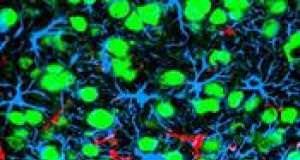B Vitamins Slow Brain Atrophy In People With Memory Problems
Daily tablets of certain B vitamins can halve the rate of brain shrinkage in elderly people who suffer from mild memory problems, an Oxford University study has shown. The two-year randomized clinical trial is the largest to study the effect of B vitamins on mild cognitive impairment, and one of the first disease-modifying trials in the Alzheimer's field to show positive results in people.
Chemicals Found In Fruit And Vegetables Offer Dementia Hope
A group of chemicals found in many fruits and vegetables, as well as tea, cocoa and red wine, could protect the brain from Alzheimer’s...
Medications Found To Cause Long Term Cognitive Impairment Of Aging Brain,...
Drugs commonly taken for a variety of common medical conditions including insomnia, allergies, or incontinence negatively affect the brain causing long term cognitive impairment in older African-Americans, according to a study appearing in the July 13, 2010 print issue of Neurology, the medical journal of the American Academy of Neurology.
Sleep Deprivation Impairs cAMP Signalling In The Hippocampus.
Sleep deprivation impairs cAMP signalling in the hippocampus. Millions of people regularly obtain insufficient sleep. Given the effect of sleep deprivation on our lives, understanding the cellular and molecular pathways affected by sleep deprivation is clearly of social and clinical importance. One of the major effects of sleep deprivation on the brain is to produce memory deficits in learning models that are dependent on the hippocampus. Here we have identified a molecular mechanism by which brief sleep deprivation alters hippocampal...
This Is Your Brain On Sugar: Study In Rats Shows High-Fructose...
Attention, college students cramming between midterms and finals: Binging on soda and sweets for as little as six weeks may make you stupid. A new UCLA rat study is the first to show how a diet steadily high in fructose slows the brain, hampering memory and learning -- and how omega-3 fatty acids can counteract the disruption. The peer-reviewed Journal of Physiology publishes the findings in its May 15 edition.
Increased Risk Of Death In Men With Insomnia And A Short...
A study in the Sept. 1 issue of the journal Sleep found an elevated risk of death in men with a complaint of chronic insomnia and an objectively measured short sleep duration. The results suggest that public health policy should emphasize the diagnosis and appropriate treatment of chronic insomnia.
Brain Damage Triggered By Mini-Strokes Detailed
A new study appearing December 12 in the Journal of Neuroscience details for the first time how "mini-strokes" cause prolonged periods of brain damage and result in cognitive impairment. These strokes, which are often imperceptible, are common in older adults and are believed to contribute to dementia.
Mild Cognitive Impairment Is Common, Affects Men Most, Study Finds
Researchers involved in the Mayo Clinic Study of Aging report that more than 6 percent of Americans age 70 to 89 develop mild cognitive impairment (MCI) every year. Also, the condition appears to affect men and those who only have a high school education more than women and those who have completed some higher education. People with MCI are at the stage between suffering the normal forgetfulness associated with aging and developing dementia, such as that caused by Alzheimer's disease.
Dopamine Controls Formation Of New Brain Cells, Salamander Study Shows
A study of the salamander brain has led researchers at Karolinska Institutet to discover a hitherto unknown function of the neurotransmitter dopamine. In an article published in the scientific journal Cell Stem Cell they show how in acting as a kind of switch for stem cells, dopamine controls the formation of new neurons in the adult brain.
Blueberry-Rich Nutritional Supplement Improves Cognitive Performance in Older Adults
Declines in the underlying brain skills needed to think, remember and learn are normal in aging. In fact, this cognitive decline is a fact...
New Findings Contradict Dominant Theory In Alzheimer’s Disease
For decades the amyloid hypothesis has dominated the research field in Alzheimer's disease. The theory describes how an increase in secreted beta-amyloid peptides leads to the formation of plaques, toxic clusters of damaged proteins between cells, which eventually result in neurodegeneration.
Brain Rhythm Associated With Learning Linked To Running Speed
Rhythms in the brain that are associated with learning become stronger as the body moves faster, UCLA neurophysicists report in a new study. The research team, led by professor Mayank Mehta, used specialized microelectrodes to monitor an electrical signal known as the gamma rhythm in the brains of mice. This signal is typically produced in a brain region called the hippocampus, which is critical for learning and memory, during periods of concentration and learning.















